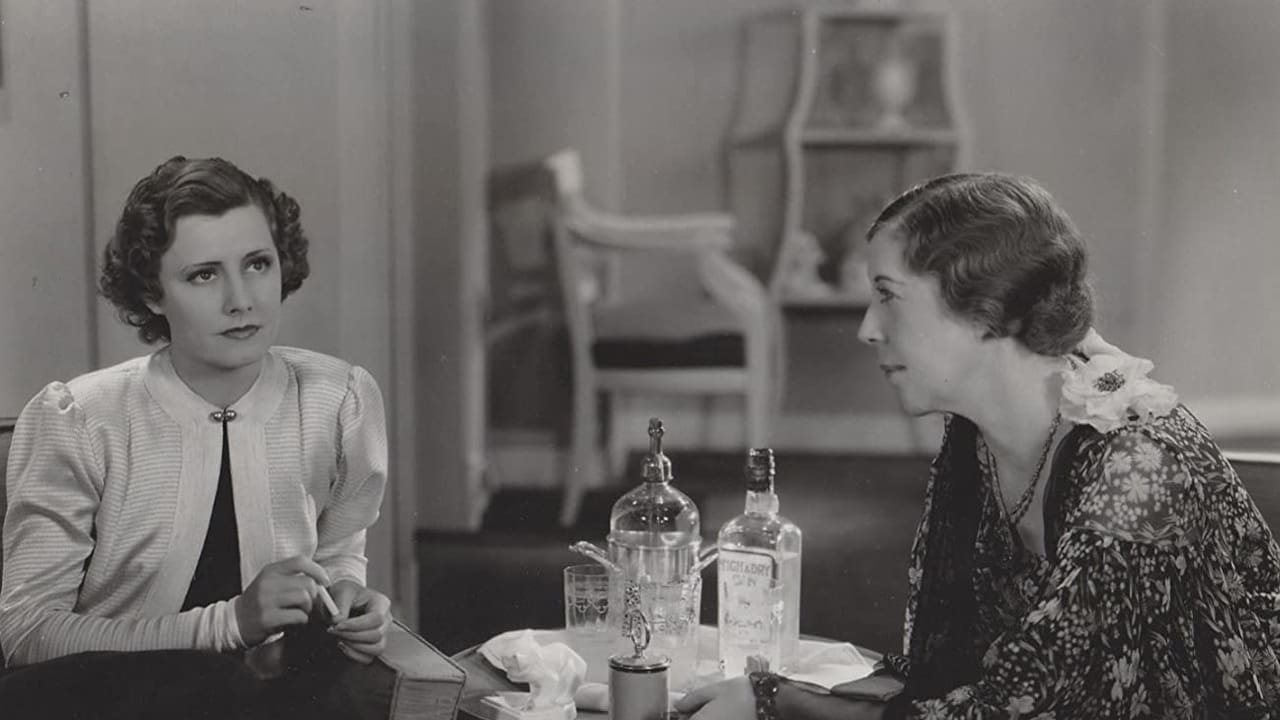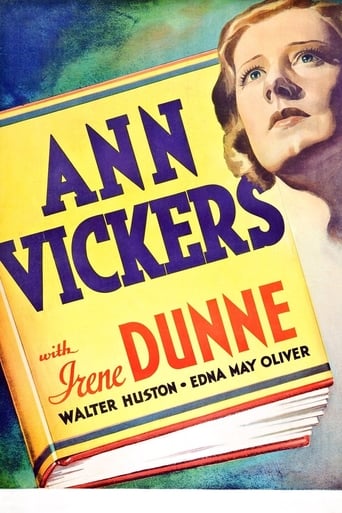

Only three years into her Hollywood career (after the initial misstep of "Leathernecking" (1930), Irene Dunne shines in this pre-Code drama. Her portrayal of Sinclair Lewis' "Ann Vickers" is complex, layered and multi-faceted. She is a modern woman and she is determined to change the world as Edna Mae Oliver's character states "if it takes her all winter". But the world almost breaks her. She is impregnated and then emotionally abandoned by Bruce Cabot's cad "Lafe", sent to work in a Purgatory of a women's prison, and finally saved by the love of Walter Huston's Judge Barney Dolphin. In him, she has met her equal--morally, intellectually, and emotionally. Their love is here to stay, as we see when she not only proudly bears their son out of wedlock but stands by him when he is sent to prison on political corruption and graft charges trumped up by his opposition. She too suffers in that she loses a top-tier professional post and must makes ends meet by writing freelance newspaper articles. However, she is undaunted and toughs it out until such time that Barney is paroled and reunited with her and their young son. It is so refreshing to see Dunne in this early role, so far removed from both the screwball comedy and perfect wife and mother roles she would play in the middle and latter phases of her long career. We mourn with her the loss of her first child, the death of whom is ambiguously depicted as coming about by abortion. We rejoice in her finding her soulmate, Barney and cheer them for their unaffected love and affection and the joy they express over their impending parenthood. While this is a "weepie", the Queen of which she would become, Dunne's performance is superior to that of her similar roles of this era. Her talent is just as complex and strong as that of her character and she inhabits the role exquisitely.
... View More"Ann Vickers" is a 1933 film starring Irene Dunne and Walter Huston. It is told with the sensibility of the 1930s and with an eye toward female audiences.Dunne is Ann Vickers, a social reformer dedicated to her career and not interested in men or dating. Nevertheless, due to her attractiveness, men are interested. One is a soldier about to be shipped out during WW I (Bruce Cabot) with whom she enjoys a one-night stand and becomes pregnant. She has promised to marry him if he still wants her upon his return; he really doesn't. She goes off with her friend Malvina (Edna May Oliver) to her country place. In one scene, she talks about how much she wanted the baby girl, and it was a shame that the baby died. So either she miscarried or had an abortion. We're left hanging. If she and Malvina were going out of the city, I understood that it was so she could be pregnant and no one would know it. Maybe not.Ann throws herself into her work for prison reform, and meets a judge (Walter Huston) whose wife lives in Europe and won't divorce him. And complications ensue.You can tell by the way I've related this story that this is not about a woman ahead of her time, independent, an early feminist, although that is supposed to be what it is.Instead the story is skewed toward her love life, and she marvels at how the Huston character has "killed her ambition." As in so many other movies, ambition and careers mean one thing - spinsterhood - and a happy ending can only be achieved if she forsakes her career for the man she loves.It sounds like I'm knocking this philosophy - I'm not. This was the attitude back then and in some places, it's still the attitude. The Vickers character was unconventional sexually, a feature of precode. Once the '40s hit, she would be in tailored suits up to her neck, aggressive in business, and softened by love, which removes all that frustration.After seeing a few of these, the message is clear.So rather than focus on her reform work, although it's mentioned, the movie focuses on her love life. And spoils what could have been a good story.Dunne is wonderful as Ann, and you sense that she has a real backbone. Her character doesn't allow herself to love at first, perhaps for fear of being hurt.Huston as the judge with more than a few issues is always good, and Edna May Oliver gives an earthy, practical performance.All in all, I did not think this was very good. It would have been a lot better with more balance between Ann's private life and career, and if she had found one.
... View MoreLackluster romantic drama with feminist elements. Basically it's Irene Dunne spouting off about wanting to have her own career and being involved in relationships with douchebags. All of the success she has career wise is ultimately attributed to a man and the film's message seems to be that a woman's happiness only comes from the love of a man, so I really don't see where feminists are supposed to find much to love about this film. The brief middle part of the film dealing with the brutal goings-on at a women's prison are most interesting. They should've made an entire film of that. The rest is forgettable. The cast is fine. No standouts. Edna May Oliver is wasted, which is just criminal.
... View MoreWhen Merian C. Cooper replaced David O. Selznik as production head of RKO, he continued the habit of acquiring literary works for filming. "Ann Vickers" was one of Sinclair Lewis' most controversial books that covered such "hot topics" (for the time) as abortion, women's voting rights, sex and divorce, not to mention a realistic appraisal of life in a women's prison. It was written in 1933 and by the end of the year had been turned into a glossy woman's picture starring an intelligent actress who was making Martyrdom movies her own domain - Irene Dunne. This is a super movie - why don't they make movies like this anymore! Yes, it is a women's picture but not the sudsy "Mrs. Miniver" type that would become popular in the 1940s. Superlative Irene Dunne makes you believe in every scene she plays."She's going to make the world over - if it takes all winter" says Malvina (wonderful Edna May Oliver) of her friend Ann Vickers (Irene Dunne). Social worker Ann has a passion for helping people and when she meets disillusioned soldier (Bruce Cabot, playing a heel as usual) she spends a blissful week, with promises of marriage when he returns from the front. His letters become less frequent and when they accidentally meet at a restaurant, she realises that he has forgotten all about her. After her baby dies, she finds a job at a women's prison. Copperhead Gap Prison is grim,especially under Captain Waldo, a lecherous "Simon Legree" type, who yearns for the "good old days" of public floggings with the cat 'o nine tails and other nice amusements!!! Ann is appalled at the harsh treatment the women receive - she witnesses lashings, even hangings and when she is forced to leave writes a best seller that exposes the conditions of prison life. The publicity helps her secure a job as Governor at Styvessaunt Industrial Home. "I'm going to get you off the snow - cold turkey" (words I never thought I would hear Irene Dunne speak), "Show a little respect - I'm a A.M. and a Ph.D, - Well, I'm only a A.B.A. and a SOB" -the racy dialogue sprinkled through the film shows it was made in pre-code times - There's even a joke about going "cold turkey" later in the film.At a party she meets Judge Barney Dolphin - it is nice to see Walter Huston playing a pretty down to earth guy for once - yes, he is a Judge, but he is certainly not stern or forbidding. He is the man who, through his high praise, helped make her book a best seller and when they meet there is an instant attraction. Ann has found her soul mate - they are both intelligent and have high ideals. He is married - to a grasping woman, who prefers to live abroad and will not give him a divorce. they embark on a relationship and when he is sent to prison, by standing by him Ann loses her prestigious appointment. Trying to get friends to rally around her, she has a showdown with Lindsay Atwell (Conrad Nagel), an old admirer and a part that probably made more sense in the novel. Ann is reduced to writing articles about prison reform from her small upstairs flat and when Barney is released, finds Ann and their little boy waiting for him.With other stars, this film may have been maudlin - but the superior acting skills of Dunne and Huston make this an extremely fine movie. J. Carroll Naish has a "blink and you'll miss him" part as a drunken doctor, Gertrude Michael has a small scene as Barney's wife and if there is a prison matron in a movie, chances are it's Mary Foy.Highly, Highly Recommended.
... View More